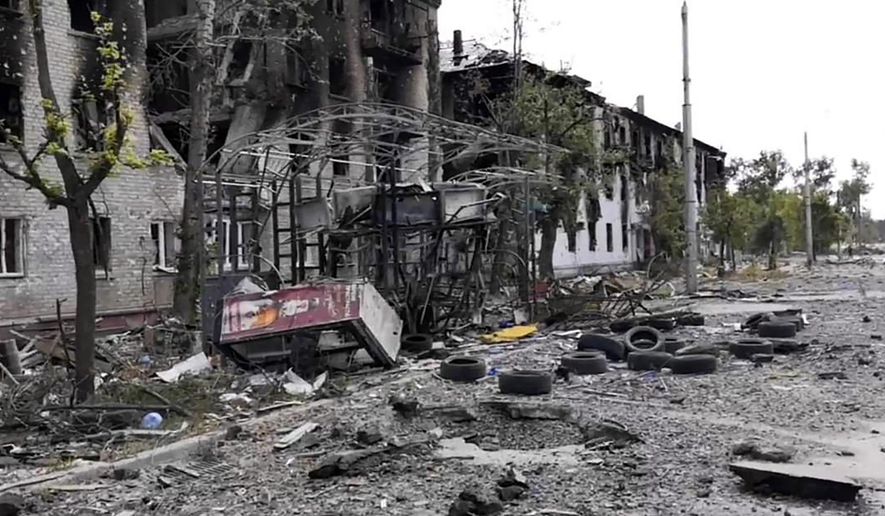Russian forces over the weekend captured the key city of Lysychansk in Ukraine’s eastern Donbas region, marking a major strategic win for Moscow while bringing virtually all of the disputed Luhansk province under Kremlin control.
Russian Defense Minister Sergei Shoigu said that his troops have completed the “liberation of the Luhansk People’s Republic” after the final Ukrainian defenders retreated from Lysychansk to set up defensive lines deeper in eastern Ukraine.
Those Ukrainian troops are now preparing for a fierce fight in and around the cities of Siversk, Slovyansk and Bakhmut, military analysts say, as the Russian advance pushes further into Ukraine.
Ukrainian officials said they made a strategic decision to essentially abandon Lysychansk to preserve manpower and resources for the coming battles.
“The continuation of the defence of the city would lead to fatal consequences. In order to preserve the lives of Ukrainian defenders, a decision was made to withdraw,” the Ukrainian military said in a social media post on Sunday, according to Reuters and other English-language media.
Russia’s victory at Lysychansk could carry significant ramifications for the future of the war and of eastern Ukraine itself.
SEE ALSO: TikTok admits that some China-based employees can access U.S. user data
Russia recognizes the Luhansk and Donetsk regions as sovereign states and has claimed its military operation in Ukraine is designed to liberate those territories.
Both provinces officially remain parts of Ukraine. Kyiv and the West reject Russia’s claims and the notion that the provinces are independent states.
But there is some support in those areas for the Russian invasion. Mr. Shoigu said Sunday that his troops were joined by local separatist militias sympathetic to Moscow.
Such local support, combined with Russia’s increasing troop presence in the area, likely means that the Luhansk province will remain under Russian control unless Ukraine can mount a major counterattack.
Such a counterattack seems unlikely, given Kyiv’s decision to pull its forces back to defend cities further inland.
Russian President Vladimir Putin and his top generals have prioritized the capture of Luhansk and Donetsk for the past several months. Those regions have become Moscow’s top targets after the failed Russian attempt to seize Kyiv in the early weeks of the war.
SEE ALSO: Ukraine’s drone blitz loses its edge as Russian invasion advances
Indeed, local officials say that Moscow has put its full military weight behind the push to capture Luhansk and Donetsk, which together make up the Donbas region.
“The occupiers threw all their forces on Lysychansk. They attacked the city with incomprehensibly cruel tactics,” Luhansk Gov. Serhiy Haidai said in a post on Telegram. “They suffer significant losses, but stubbornly advance. They are gaining a foothold in the city.”
Even before Ukrainian officials acknowledged the withdrawal, Western analysts said there were clear signs that forces had pulled back from the city.
“Geolocated footage showed Russian forces casually walking around northern and southeastern neighborhoods in Lysychansk in a way that suggests that there are few or no remaining Ukrainian forces in the city as of July 2,” researchers with the Institute for the Study of War wrote in an analysis Saturday. “Ukrainian military officials did not publicly announce a troop withdrawal but neither did they report on defensive battles around Lysychansk.”
Russian forces likely will consolidate their hold on Lysychansk before mounting new attacks on Siversk, Slovyansk and Bakhmut, researchers said.
Meanwhile, the Russian Defense Ministry claimed Sunday that Ukrainian forces had fired missiles into western Russia, targeting the cities of Kursk and Belgorod.
Belarusian officials also claimed over the weekend that Ukrainian troops had fired rockets toward their country, but all were intercepted by air defenses.
The Ukrainian military did not immediately comment on either claim, according to The Associated Press.
• This article is based in part on wire service reports.
• Ben Wolfgang can be reached at bwolfgang@washingtontimes.com.




Please read our comment policy before commenting.